We invite you to click on our inquiry or order form links at the bottom of this BookNotes post. We would be happy to answer any questions about these resources, or ship out any books you may need. Any books mentioned are 20% off. As always, we truly appreciate your support. Thanks. Byron & Beth Borger
Last week we had a good time selling books at a small academic conference on Mercersburg Theology hosted by Lancaster Theological Seminary. The event was sponsored by the Mercersburg Society, a group of scholars and pastors given to the study of 19th century theological leaders John Williamson Nevin and Philip Schaff. These German-American Reformed leaders spoke and wrote widely in the years before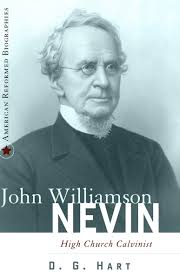 the Civil War, promoting what Nevin biographer D.G. Hart calls a “high church Calvinism” which argued for a liturgically and theological rich view of Eucharist and the church catholic. Nevin studied under the famous Charles Hodge at Princeton, ended up in Pittsburgh for a while, and then to the German-Reformed Mercersburg Academy, not far from Gettsyburg, PA. Nevin later moved to Lancaster, first at the college now known as Franklin & Marshall; the tiles from some of the Mercersburg building are now in a building at Lancaster Seminary. Nevin and Schaeff opposed revivalism and sects and emotionally manipulative evangelism crusades, and insisted on a “mystical presence” in communion. Their critique of popular revivalism (and the appearance of being close to Rome) grew contentious and Philip Schaff was tried and found innocent of charges of heresy by his German Reformed denomination in 1845. The long and tumultuous debate was held in York, PA.
the Civil War, promoting what Nevin biographer D.G. Hart calls a “high church Calvinism” which argued for a liturgically and theological rich view of Eucharist and the church catholic. Nevin studied under the famous Charles Hodge at Princeton, ended up in Pittsburgh for a while, and then to the German-Reformed Mercersburg Academy, not far from Gettsyburg, PA. Nevin later moved to Lancaster, first at the college now known as Franklin & Marshall; the tiles from some of the Mercersburg building are now in a building at Lancaster Seminary. Nevin and Schaeff opposed revivalism and sects and emotionally manipulative evangelism crusades, and insisted on a “mystical presence” in communion. Their critique of popular revivalism (and the appearance of being close to Rome) grew contentious and Philip Schaff was tried and found innocent of charges of heresy by his German Reformed denomination in 1845. The long and tumultuous debate was held in York, PA.
The ecumenical gathering last week in Lancaster brought together a fun mix of mainline UCC and Lutheran pastors, a few older school Calvinists, a Dutch neo-Calvinist, a Ukrainian Orthodox priest, a few Catholics and Presbyterians. A local Pentecostal philosopher and an ecumenically-minded Mennonite were active participants. From sharing a Psalter as we sang Psalms with Father Tony Ugulnik (whose book about the Russian church and the theology of icons was very important to me during the nuclear freeze campaign) to chatting with a prof from Westminster Theological Seminary, to hearing the always astute Dr. Lee C. Barrett, whose new book is called – get this! – Eros and Self-Emptying: The Intersections of Augustine and Kierkegaard; (Eerdmans; $48.00) the whole Mercersburg Theology conference was stimulating and in many ways deeply moving to me.
nuclear freeze campaign) to chatting with a prof from Westminster Theological Seminary, to hearing the always astute Dr. Lee C. Barrett, whose new book is called – get this! – Eros and Self-Emptying: The Intersections of Augustine and Kierkegaard; (Eerdmans; $48.00) the whole Mercersburg Theology conference was stimulating and in many ways deeply moving to me.
I don’t know if I am a “high church Calvinist” or not – I suppose I might admit that, not unlike fixed hour prayer or third world mission work, I like reading about it rather then doing it. I don’t know what I believe about communion, either, really (although had some things clarified by Understanding Four Views on the Lord’s Supper, a discussion between four different authors, edited by my friend John Armstong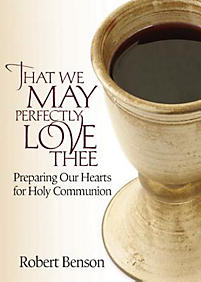 (Zondervan; $16.99) and had my heart wonderfully warmed by the lovely, little That We May Perfectly Love Thee by Robert Benson (Upper Room; $14.00.) The Mercersburg Society recommends What Happens in Holy Communion? by Michael Welker (Eerdmans; $24.00) and it is very through, and very ecumenically fair.
(Zondervan; $16.99) and had my heart wonderfully warmed by the lovely, little That We May Perfectly Love Thee by Robert Benson (Upper Room; $14.00.) The Mercersburg Society recommends What Happens in Holy Communion? by Michael Welker (Eerdmans; $24.00) and it is very through, and very ecumenically fair.
But I do know that I am an member of Christ’s ecumenical church and find myself often wishing for more experiences of diversity within God’s big tent. With a few (significant) caveats, I’d say this event at the UCC seminary was one of the most ecumenical gatherings I ever attended. Thanks be to God.
Which leads me to want to name a few books that seem to fit their theme.
Hearts & Minds stocks the most popular inspirational best-sellers and books from all the recognizable publishers, but we have some harder to find resources, too. I won’t describe here the books that are in print by Nevin and Schaff (although we’ve got ’em) or the growing body of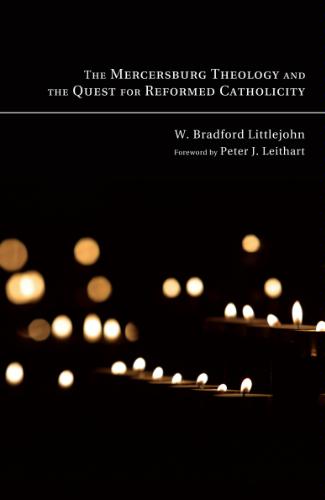 literature on Mercersburg. Some do suggest that W. Bradford Littlejohn’s book, The Mercersburg Theology and the Quest for Reformed Catholicity (Wipf & Stock; $24.99) may be the best place to begin for those that want to explore “Reformed Catholicity.” This movement is, by the way, not as obscure as it may sound; some mainline folks who feel the drift away from core orthodoxies within their denominations see these 19th century Germans as a helpful corrective to 20th century goofiness, and not a few conservative Presbyterian and Reformed folk are discovering this mature way into a more liturgically rich, aesthetically nuanced and confessionally driven church experience. As one person said, “everybody is going Mercersburg-crazy these days.”
literature on Mercersburg. Some do suggest that W. Bradford Littlejohn’s book, The Mercersburg Theology and the Quest for Reformed Catholicity (Wipf & Stock; $24.99) may be the best place to begin for those that want to explore “Reformed Catholicity.” This movement is, by the way, not as obscure as it may sound; some mainline folks who feel the drift away from core orthodoxies within their denominations see these 19th century Germans as a helpful corrective to 20th century goofiness, and not a few conservative Presbyterian and Reformed folk are discovering this mature way into a more liturgically rich, aesthetically nuanced and confessionally driven church experience. As one person said, “everybody is going Mercersburg-crazy these days.”
Well, be that as it may, here are a handful of other interesting titles that spring to mind.
S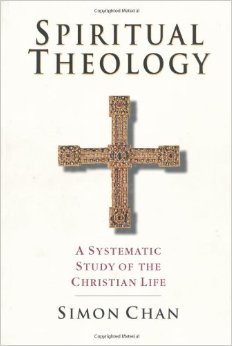 piritual Theology: A Systematic Study of the Christian Life Simon Chan (IVP) $24.00
piritual Theology: A Systematic Study of the Christian Life Simon Chan (IVP) $24.00
L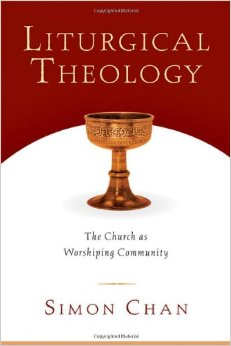 iturgical Theology: The Church as a Worshipping Community (IVP) $25.00
iturgical Theology: The Church as a Worshipping Community (IVP) $25.00
These two are nearly magisterial, amazing in depth and richness, balanced and solid, as beautiful as they are rare. Conservative and Reformed and a splendidly rigorous thinker, Dr. Chan none-the-less allows rational dogmatics to lead him to more mystical experience, and shows us the lived implications of a mature dogmatics. This is rare indeed. In the second splendid volume (so germane to the Mercersburg project), he relates all of this for the community of faith, constituted by worship. If anyone in more mainline denominational traditions wonder about the pop images of TV shallow evangelical piety, take a look at these. They will change your view of evangelicals, I’m confident, and more, spending the summer with these might helpfully impact the soul of any kind of serious reader.
Chan’s brand new IVP book, by the way, is called Grass-Roots Asian Theology: Thinking the Faith from the Ground Up. I am sure it is good.
D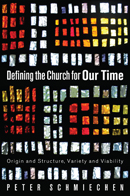 efining the Church for Our Time: Origin and Structure, Variety and Viability Peter Schmiechen (Wipf & Stock) $17.00 Dr. Schmiechen is a beloved President Emeritus at Lancaster Theological Seminary, and I have long been a fan of his first book Christ the Reconciler: A Theology for Opposites, Differences, and Enemies (Eerdmans; $21.99) which we still happily sell, and is still as relevant as ever, as we struggle with conflict in the local church and the nation, and globally. His book on various atonement theories (Saving Power: Theories of Atonement and Forms of the Church; Eerdmans; $39.99) shows him as smart, faithful, innovative and a fine example of inclusive, generously orthodox thinking. He has two recent books, and Defining the Church for Our Time formed the basis for the opening keynote talk at the Mercersburg Conference. I highly recommend it for anyone pondering the nature of the church and needing an innovative, contemporary multi-faceted ecclesiology.
efining the Church for Our Time: Origin and Structure, Variety and Viability Peter Schmiechen (Wipf & Stock) $17.00 Dr. Schmiechen is a beloved President Emeritus at Lancaster Theological Seminary, and I have long been a fan of his first book Christ the Reconciler: A Theology for Opposites, Differences, and Enemies (Eerdmans; $21.99) which we still happily sell, and is still as relevant as ever, as we struggle with conflict in the local church and the nation, and globally. His book on various atonement theories (Saving Power: Theories of Atonement and Forms of the Church; Eerdmans; $39.99) shows him as smart, faithful, innovative and a fine example of inclusive, generously orthodox thinking. He has two recent books, and Defining the Church for Our Time formed the basis for the opening keynote talk at the Mercersburg Conference. I highly recommend it for anyone pondering the nature of the church and needing an innovative, contemporary multi-faceted ecclesiology.
I like Walter Brueggemann’s astute observation, not only that Peter has been “in the matrix of dispute in his own church” but that Schmiechen
reflects on ways in which our pet notions have often reduced the gospel to manageable ideology, and the capacity and readiness of the gospel to take many forms, formulations, and practices. This is sober and realistic, but powerfully hopeful invitation to rethink the faithfulness of the church in its great diversity.
Peter Schmiechen’s very readable 2012 release, Words Unspoken: An Invitation to Christian Faith (Wipf & Stock; $13.00) is really sweet, too. It is thoughtful and useful and I think very good to recommend not only for seekers or those re-evaluating their beliefs and church affiliation, but for any adult group wanting a fresh and thought-provoking reminder of key notions of Christian faith.
E vangelical Versus Liturgical? Defying a Dichotomy Melanie C. Ross (Eerdmans) $17.00 Oh how I wish this had been released early last week – it came just a few days ago – as I’d have pushed my way to the Mercersburg podium to tell everyone about it. I cannot explain simply my big enthusiasm for this important new work. To put it as succinctly as possible, it is a semi-scholarly, very accessible, warm study of how evangelicals in the free church tradition have, in many cases, deepened and expanded their own worship practices, indicating a possible new rapprochement between mainline congregants and scholars who are high church liturgy lovers and those folk with a less complex sort of worship style. The subtitle helps us see why is so very special about this rare kind of approach.
vangelical Versus Liturgical? Defying a Dichotomy Melanie C. Ross (Eerdmans) $17.00 Oh how I wish this had been released early last week – it came just a few days ago – as I’d have pushed my way to the Mercersburg podium to tell everyone about it. I cannot explain simply my big enthusiasm for this important new work. To put it as succinctly as possible, it is a semi-scholarly, very accessible, warm study of how evangelicals in the free church tradition have, in many cases, deepened and expanded their own worship practices, indicating a possible new rapprochement between mainline congregants and scholars who are high church liturgy lovers and those folk with a less complex sort of worship style. The subtitle helps us see why is so very special about this rare kind of approach.
The author is a professor at Yale Divinity School and knows well the best literature of the recent renaissance in liturgical studies – from Lutheran, Catholic, Orthodox and Anglican scholars such as Gordon Lathrop and Gail Ramshaw and Frank Senn, say, to Dom Gregory Dix, Aiden Kavanagh or even Marva Dawn. But, Professor Ross also knows the ways in which more conventionally conservative evangelical congregations have thought well about worship as new forms of contemporary liturgy have evolved from “seeker sensitive” blandness and mega-church performances.
Ross knows all this about thoughtful evangelical churches not only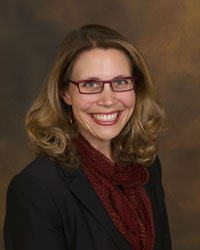 because she herself was raised in a nondenominational setting, but because she obviously knows the good work of the likes of the wonderfully generative ancient-future Robert Webber, and the generous ecumenicity of evangelical worship scholars just as John Witvliet. Her awareness, though, is not just from her past, or her scholarship, but she has spent time visiting two particularly interesting evangelical church communities. Like an anthropologist doing ethnography, she visited and observed a vibrant congregation here in Central Pennsylvania (West Shore Evangelical Free) and also a multi-ethnic urban mission in Minnesota, Eastbrook Church. These two enlightening case studies offer texture and detail in her examination of how evangelicals gather and do worship these days.
because she herself was raised in a nondenominational setting, but because she obviously knows the good work of the likes of the wonderfully generative ancient-future Robert Webber, and the generous ecumenicity of evangelical worship scholars just as John Witvliet. Her awareness, though, is not just from her past, or her scholarship, but she has spent time visiting two particularly interesting evangelical church communities. Like an anthropologist doing ethnography, she visited and observed a vibrant congregation here in Central Pennsylvania (West Shore Evangelical Free) and also a multi-ethnic urban mission in Minnesota, Eastbrook Church. These two enlightening case studies offer texture and detail in her examination of how evangelicals gather and do worship these days.
And, it gets better: Dr. Ross realizes that to truly understand the differences and similarities of highly liturgical and less formal kinds of worship practices, it will not do to just study how the Bible is use, say, or what printed or extemporaneous prayers are prayed, or how they offer communion or take up the offering. The meaning of these key acts have to be explored, and to do that, a open-minded but serious discussion of the authority of the Bible must be entertained. Which leads to questions of hermeneutics and, eventually, the theological questions about conversion, sanctification, spiritual formation and mission. Oh my, this is a huge matter, but (thank goodness) her reflections are succinct and fruitful. Volumes of work needs done on this, but her relatively brief chapters, while meaty enough, raise the major points of insight and disagreement. What a book!
I agree with Don Saliers, who refers to her “keen knowledge of ritual and liturgical studies” and calls it “wise and important” and then says it “is a major resource for anyone concerned about contrasts and convergences in worship practice.”
Here is what Jamie Smith says of it:
This is a book that many of us have been waiting for. It is winsome without being wishy-washy; critical yet profoundly charitable. Above all it is both sharp and wise. Instead of the usual invitation for evangelicals to grow up and become ‘liturgical,’ Ross empowers free-church evangelicals to see the liturgical wisdom already implicit in their practices — and presses liturgical theologians to appreciate the same. In doing so, she also invites evangelicals to become newly intentional about worship drawing from the deep wells of liturgical theology. This book is a win-win-win.
Amen! Preach it brother. And thanks be to God.
I long for inter-denominational conversations that are inclusive of all streams of the river of renewal happening within the global body of Christ. Those skilled at ecumenical conversations within the more traditional large communions – those that struggled with Baptism, Eucharist and Mission in the 1980s, for instance, simple must grow more adept at including evangelicals, charismatics and others who have heretofore not participated much in these kinds of discussions. To get at ecumenicity by way of this wonderful case study of worship — and to thereby help all of us realize that there need not be a hard dichotomy between ritual and freedom, between ancient tradition and modern experience, between mind and heart, between, as the book says, between evangelical and liturgical – is just wonderful. I cannot recommend this new book more heartily. Kudos to Dr. Ross and the Calvin Institute of Christian Worship who helped produce it.
THREE GROUPS OF READERS
Here are three groups of people who should read Evangelical Versus Liturgical?
First, mainline denominational folks or those with traditionally high liturgical forms who may need to be reminded, in their own terms, what the church down the street really does and why they do it. I am routinely surprised at the lack of awareness about, and sometimes animosity shown towards, nondenominational churches, among my liberal friends and this slim book really could go a long way to help ease these tensions, which (at least sometimes) come from caricature and misunderstanding.
Secondly, I so hope this book will be studied by evangelicals of all sorts, but especially pastors and preachers and those who nowadays are called worship leaders — musicians, singers, church artists. This covers more than what you might get from the good books by Matt Redman, Bob Kauflin, or the Passion Conference messages; it is a sympathetic exploration for rich and artful worship services, rooted in solid theology and ancient ideas. Defy the dichotomy, anyone? Please?
And, thirdly, theologians of all kinds. Like the Mercersburg theology conference, this is a great, great example of a new and necessary conversation, made fresh and useful, as we ponder what has been fruitful and faithful in former thinking and what might be generative and good as we move into this new era. Phyllis Tickle in her very interesting The Age of the Spirit (Baker; $) is suggestive in inviting us to new conversations – not rehashing, but revisiting, ancient theological quandaries (like that which contributed to the Great Schism.) Evangelical Versus Liturgical?: Defying a Dichotomy will help us all think fairly and helpfully, and it is a beautiful example of the kind of ecumenical writing that is needed in these days.
Read a bit about the author (a Messiah College grad, by the way, with a PhD from Notre Dame) and her work, here.
C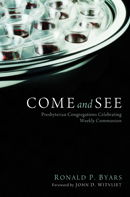 ome and See: Presbyterian Congregations Celebrating Weekly Communion Ronald P. Byars (Wipf & Stock) $19.00 I have not read this yet, but it looks just so very interesting (and so apropos for this post about the Mercersburg conference) that I had to mention it. You may know this author for his other books on Reformed worship and as a firm critic of what he considers to be shallow and unhelpful “contemporary” services. (I hope he reads the Melanie Ross!) Here, he has given us a book unlike any other of which I know: he studies Presbyterian congregations who have taken up weekly communion. He not only tells of these churches and their ups and downs, and how it has or hasn’t worked for them in their local setting, but he explores their reasons, motivations, contextualized theologies and the spiritualities that emerge from this kind of liturgical practice.
ome and See: Presbyterian Congregations Celebrating Weekly Communion Ronald P. Byars (Wipf & Stock) $19.00 I have not read this yet, but it looks just so very interesting (and so apropos for this post about the Mercersburg conference) that I had to mention it. You may know this author for his other books on Reformed worship and as a firm critic of what he considers to be shallow and unhelpful “contemporary” services. (I hope he reads the Melanie Ross!) Here, he has given us a book unlike any other of which I know: he studies Presbyterian congregations who have taken up weekly communion. He not only tells of these churches and their ups and downs, and how it has or hasn’t worked for them in their local setting, but he explores their reasons, motivations, contextualized theologies and the spiritualities that emerge from this kind of liturgical practice.
I can’t wait to see what he says, and what he learned. It is also interesting that some of these parishes that made the transition were long-established ones while others were newer church developments. I suspect he is mostly appreciative of these efforts, and will make a case that the congregations are better off for their Eucharistic experiences and bold liturgical fidelity — even among younger folks with postmodern sensibilities. The Calvin Institute on Christian Worship Director John Witvliet wrote the Foreword. Should be good.
I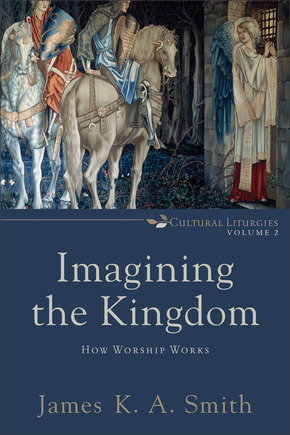 magining the Kingdom: How Worship Works James K.A. Smith (Baker Academic) $22.99 I needn’t do a serious review of this here, now — BookNotes readers know how we are fans of Jamie Smith, that we heartily commend nearly all of his many books. I can hardly say how much I value this book and how important I think it is.
magining the Kingdom: How Worship Works James K.A. Smith (Baker Academic) $22.99 I needn’t do a serious review of this here, now — BookNotes readers know how we are fans of Jamie Smith, that we heartily commend nearly all of his many books. I can hardly say how much I value this book and how important I think it is.
(Did you hear that we are hosting him at our third annual Pittsburgh Summer Lecture, co-sponsored by the CCO out at Robert Morris University, near Pittsburgh, on July 22nd? Contact us if you want more information.)
There were, apparently, debates about various doctrines of worship in the Mercerburg hey-day, and we still have much to discuss about the nature of our liturgies. I believe this could be one of those few “must-read” resources that helps us understand the nature of ritual, the formative power of liturgies, the Biblical counter-story that should be embodied in Christian worship and how it should rehearse that story — and which “sanctifies perception” so that we can be in the world as God’s Kingdom people. I do not know any more important voice in these conversations today than Jamie Smith.
Heady folks might dig that this could be called “a phenomenology of worship.” Others might want to skip a few of the more philosophical pages, and camp out on his brilliant discussions about embodiment, ritual, the nature of our heart’s desires, and how redeemed rituals can redirect our disordered loves, etc. etc. The opening chapter does a very succinct and helpful overview of the previous “cultural liturgies” volume, Desiring the Kingdom and while I highly recommend that, for our purposes in this list, one could start with Imagining…
Check out one of his recent lectures on this youtube video (taken from a conference in honor of Robert Webber sponsored by Trinity Evangelical School for Ministry in Ambridge, PA.) He is just fantastic here and reminds us how formation happens in the sacred space of sacramental worship — which always, he observes, always ends with a sending. Do check it out and buy the books!
One dear friend, by the way — himself a thoughtful artist, mature worship leader, and Christian publisher — says Desiring the Kingdom “changed his life.” When I asked him what he meant, he noted how it has changed his view of worship and his vision of liturgical renewal in his local parish. That’s another reason we commend this book — it really might rock your world for the better.
From Times Square to Timbuktu: The Post Christian West Meets the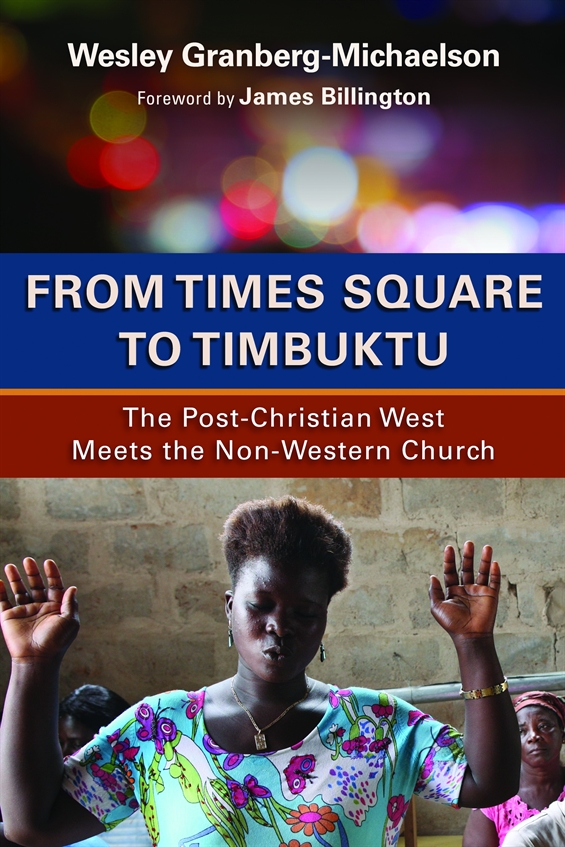 Non-Western Church Wesley Granberg-Michaelson (Eerdmans) $20.00 One of the things lacking (in my humble estimation) at the Mercersburg gathering was any sustained and serious conversation about the multi-ethnic, post-colonial nature of the church. One doesn’t need (although it helps) to have all the seminal books of Philip Jenkins, Lamin Sanneh, Andrew Walls or Mark Noll, to know that we are now in an era when –for the first time in church history – there are more non-white than white Christians and the center of gravity for the church universal has crept South. It is simply a matter of data and demographics to say that the church isn’t, technically, North American or Euro-centric or Western.
Non-Western Church Wesley Granberg-Michaelson (Eerdmans) $20.00 One of the things lacking (in my humble estimation) at the Mercersburg gathering was any sustained and serious conversation about the multi-ethnic, post-colonial nature of the church. One doesn’t need (although it helps) to have all the seminal books of Philip Jenkins, Lamin Sanneh, Andrew Walls or Mark Noll, to know that we are now in an era when –for the first time in church history – there are more non-white than white Christians and the center of gravity for the church universal has crept South. It is simply a matter of data and demographics to say that the church isn’t, technically, North American or Euro-centric or Western.
The book now to read on this stuff – whether you’ve read Jenkins or not – is this marvelous title, which we awarded one of our “Best Books of the Year” shout-outs last year. Wes Granberg-Michaelson, by the way, could have easily been at this conference, and a few of the participants knew him (I learned this, as folk commented on his book which I had displayed.) This work is wonderful, important, and, I think, very, very interesting. It does offer a bit of an overview of the global church phenomenon but also it is importantly asking how this reality effects us in the Northern hemisphere.
Does the Western church have something to lose as we see more and more church leaders who have hard-to-pronounce names and darker skins and have come from faith communities that are different then our own? Further, and importantly, is there something to gain, something the God of the universe is doing among us? Granberg-Michaelson, himself an evangelical who works in a mainline church, and who has had good experience at the global church level, insists that the answer is yes. There are large changes and shifts and trends pressing upon us now and this book will help guide us as we prepare for the changes that are already pressing.
Have you heard the analogy of how the church these days is somewhat like an airport under construction – we have to keep the day by day stuff going even as we shift to the new plans and patterns. Wes doesn’t say this, and his serious book is not a simple “how to” manual, but the illustration is apt. The book is not only theologically rich and culturally aware and truly fun and fascinating, full of stories and examples as it is; it is, I think, urgent. That some otherwise meaningful church discussions miss this topic will only haunt us if we do not turn around and pick up this thread of our times, and this piece of the postmodern/post-colonial puzzle.
S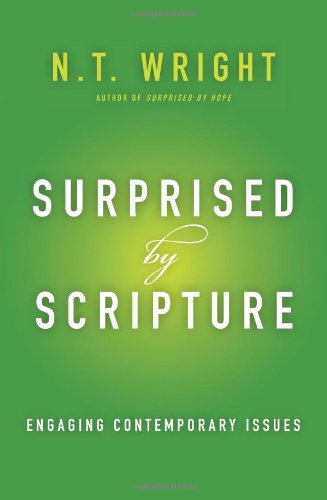 urprised by Scripture: Engaging Contemporary Issues N.T. Wright (HarperOne) $24.99 Okay, I realize that the Mercersburg debates were mostly theological in nature, and such conversations draw on Scripture often only to prove this point or another. Underneath all ecumenical conversations and near any healthy renewal of worship will be faithful and fruitful attention to the Bible. Nobody illustrates this better in our day than Tom Wright and we can be very glad that he is as well known and as popular as he is. From personal conversation at our local family diner when he visited our shop here in Dallastown to the several times I’ve heard him live and watched him engage listeners (not to mention his many books) I want to affirm his insight, his authority, his grace and kindness – he is the real deal, and I believe we should pay attention to him. This new book is a perfect reason why: it is applied faith, culturally-engaged and Biblically-grounded, showing how the Scriptures can fund the imagination and energy for surprising new social programs. (That the collection of talks and speeches is dedicated to the former director of the human genome project, now head of the National Institutes of Health, Dr. Francis Collins, is illustrative.)
urprised by Scripture: Engaging Contemporary Issues N.T. Wright (HarperOne) $24.99 Okay, I realize that the Mercersburg debates were mostly theological in nature, and such conversations draw on Scripture often only to prove this point or another. Underneath all ecumenical conversations and near any healthy renewal of worship will be faithful and fruitful attention to the Bible. Nobody illustrates this better in our day than Tom Wright and we can be very glad that he is as well known and as popular as he is. From personal conversation at our local family diner when he visited our shop here in Dallastown to the several times I’ve heard him live and watched him engage listeners (not to mention his many books) I want to affirm his insight, his authority, his grace and kindness – he is the real deal, and I believe we should pay attention to him. This new book is a perfect reason why: it is applied faith, culturally-engaged and Biblically-grounded, showing how the Scriptures can fund the imagination and energy for surprising new social programs. (That the collection of talks and speeches is dedicated to the former director of the human genome project, now head of the National Institutes of Health, Dr. Francis Collins, is illustrative.)
In this great collection, Wright offers an wonderful anthology of talks he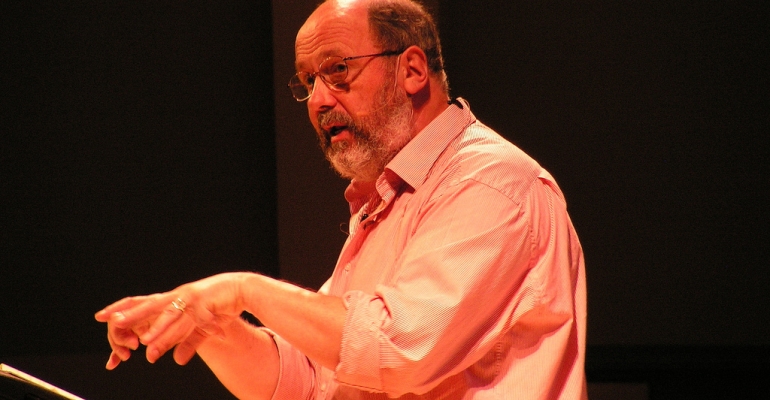 was asked to give on a variety of social topics. Of course, he is a pastor, Bishop, impressive historian and Bible scholar, and he often does nearly arcane talks on details of Jewish views of resurrection or Pauline images in his views of justification or whatnot. But here, he is talking about science, about the arts, about social justice, about faith in the academy, about climate change and the like. Many of these talks were first given in the US (although a few were delivered in his homeland) and they have a rousing feel – nothing like a keynote address at a big conference to allow a great combination of scholarship and fervor, contemporary analysis and good humor. In a way these are like sermons, but they are incidental and given to gatherings with specific interests.
was asked to give on a variety of social topics. Of course, he is a pastor, Bishop, impressive historian and Bible scholar, and he often does nearly arcane talks on details of Jewish views of resurrection or Pauline images in his views of justification or whatnot. But here, he is talking about science, about the arts, about social justice, about faith in the academy, about climate change and the like. Many of these talks were first given in the US (although a few were delivered in his homeland) and they have a rousing feel – nothing like a keynote address at a big conference to allow a great combination of scholarship and fervor, contemporary analysis and good humor. In a way these are like sermons, but they are incidental and given to gatherings with specific interests.
This may be one of his most important books. I know — this is a bit odd to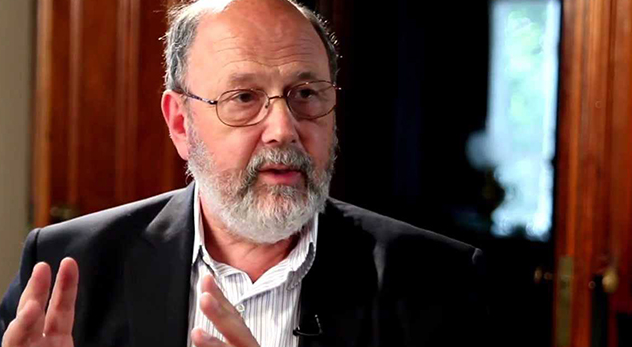 say since his major life’s work is in the multi-volume “Christian Origins and the Question of God” series. (The 800+page, two-volume, exceptionally rigorous one on Paul came out this fall.)
say since his major life’s work is in the multi-volume “Christian Origins and the Question of God” series. (The 800+page, two-volume, exceptionally rigorous one on Paul came out this fall.)
Yet, I think this inspiring new collection of talks moves us towards an answer to the “so what?” question that some of us sometimes ask. I found myself sometimes asking it at the academic Mercersburg conference, even as I realized that there is a proper place for abstract, scholarly conversations that don’t have immediate, obvious “application.”
For how two good friends of Tom Wright’s (Sylvia Keesmaat and Brian Walsh) seemed a bit pushy as respondents at an academic conference, asking him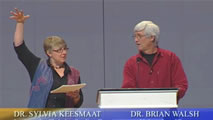 hard questions about whether his scholarship would bear good fruit in the church’s work for peace and justice, watch this video clip, or buy the book Jesus, Paul, and the People of God (IVP Academic; $24.00) which includes their “Outside A Small Circle of Friends” so-what cry as a chapter. This sort of honest discourse will keep us on our toes!
hard questions about whether his scholarship would bear good fruit in the church’s work for peace and justice, watch this video clip, or buy the book Jesus, Paul, and the People of God (IVP Academic; $24.00) which includes their “Outside A Small Circle of Friends” so-what cry as a chapter. This sort of honest discourse will keep us on our toes!
So, anyway, Wright’s new Surprised By Scripture: Engaging Contemporary Issues does just this – invites us to take good and generative Bible scholarship, solid and mature faith (creedally and liturgically-expressed – he’s an Anglican, after all) and apply this into the hurting, 21st century world as we know it. Can we be shaped by the Biblical story in ways that help us find ourselves in the new creation story, bringing glimmers of heaven to earth, erecting signposts of the Kingdom, being missional and restorative in the very way we live our lives? In Surprised by Scripture he surprises us with just how healthy and normal and right and good all this sounds – of course, of course, robust Biblical scholarship and orthodox views of the saving power of Christ should yield all manner of good stuff “in the world but not of it.” We need not choose between personal faith and public renewal, between the church’s worship and the church’s mission, between evangelism and social justice.
Perhaps if such a Biblically astute and liturgically rich worldview was on offer in the middle of the 19th century, some of the disastrous theological battles and church splits might have been avoided. Perhaps Tom Wright would have been compelling to Nevin and Schaff as they sought out an alternative between Hodge and Finney. Perhaps the contemporary children of Mercersburg might pay close attention to Wright’s redemptive trajectory of new creation social action; again, a theme that wasn’t sounded out with much gusto at last week’s gathering. Good worship simply must bear fruit of lived doxology and also of service, or it is simply a sham.
I know my friends at Lancaster were hearing academic papers and responding to complex theological nuances. As I said, I was impressed and found myself enriched by it all. Yet, there wasn’t much talk about the missio dei. There was nothing about work and vocation, little about the arts or the sciences, not even much about service, hardly any mention about racial justice or human rights, evangelism, or even concern for the environment, despite the familiarity with Gordon Lathrop’s important book Holy Ground which argues for a liturgical cosmology. A few times I wanted to shout “so what?” and, now, I can easily point anyone else who wonders about how to move from good thinking to good praxis to this very, very good new collection.
Every chapter is worth studying, and taken together, will be a great resource for anyone wanting to make connections between worship and work, between church and world, between faith and culture, between prayer and politics. It’s a great book for a study club or book group — touching down on a variety of pressing issues.
resource for anyone wanting to make connections between worship and work, between church and world, between faith and culture, between prayer and politics. It’s a great book for a study club or book group — touching down on a variety of pressing issues.
To give you just a flavor, chapters include “Healing the Divide Between Science and Religion” and “Do We Need a Historical Adam?” which were both presented at the NYC BioLogos Foundation meetings. I loved the fantastic “Jesus is Coming — Plant a Tree” talk. We so need insights such as are found in “Idolatry 2.0” — and then there is “Apocalypse and the Beauty of God” (which was first preached at Harvard in their Memorial Chapel.) There are 12 solid chapters in all. I have not read yet the final one, “Becoming People of Hope” (presented in Belfast, by the way) as I am waiting for a special time when I may need such encouragement.
Perhaps you may need these incisive chapters, too. They are all very stimulating, important, useful. So what? you say, what do we do with such rich and innovative Biblical study? Be surprised, for starters, glad and eager to learn. Surprised by Scripture is a great resource, bread for the journey.
BookNotes
DISCOUNT
ANY ITEM MENTIONED
20% off
order here
takes you to the secure Hearts & Minds order form page
just tell us what you want
inquire here
if you have questions or need more information
just ask us what you want to know
Hearts & Minds 234 East Main Street Dallastown, PA 17313 717-246-3333
